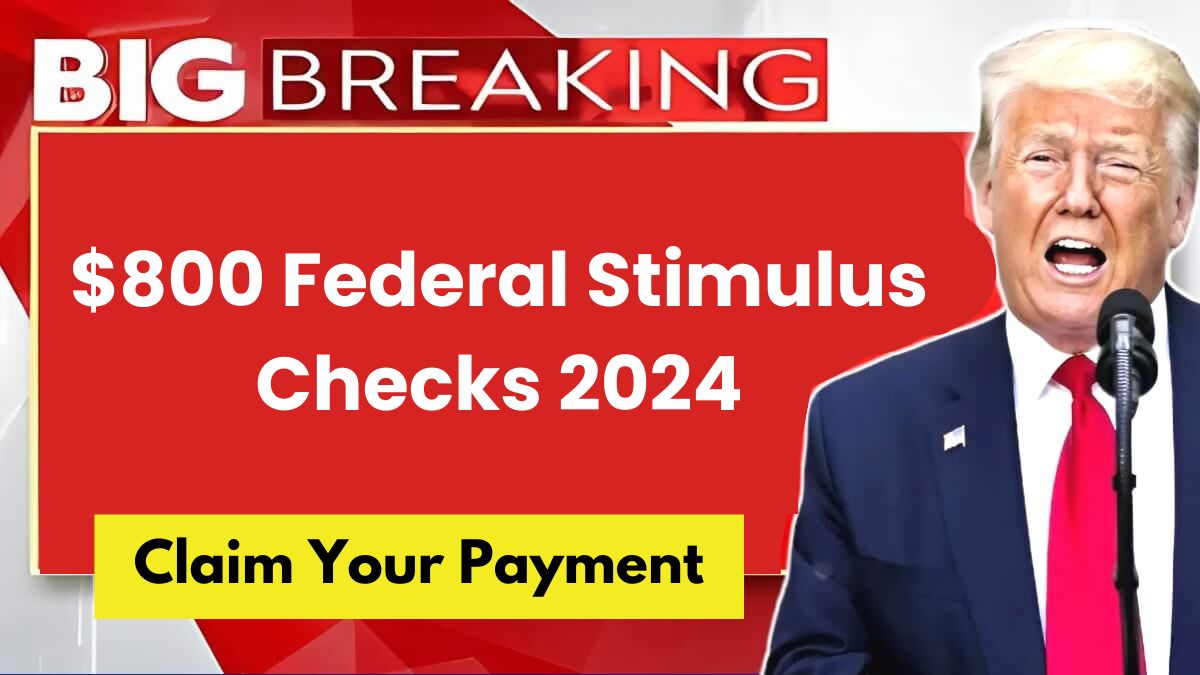As the year 2024 draws to a close, the federal government has launched a new initiative to provide $800 stimulus checks to individuals with low incomes. This program aims to help families who are facing financial hardships due to inflation and other economic challenges. By targeting essential needs such as housing, food, and healthcare, the initiative seeks to provide much-needed relief to eligible families, ensuring they have the resources to get through one of the most financially difficult times of the year.
Purpose of the $800 Stimulus Checks
The primary goal of the $800 stimulus check initiative is to mitigate the impact of inflation, which has made basic necessities more expensive. With rising costs for food, housing, and healthcare, many families are struggling to make ends meet. The stimulus checks are designed to provide immediate financial relief, helping families pay for these essential needs and reducing some of the stress caused by the current economic situation.
Beyond offering short-term relief, the program also aims to stimulate local economies. By encouraging families to use the funds for responsible consumption, the government hopes to boost demand for goods and services, benefiting small businesses and local communities. The program also focuses on promoting financial stability within households, ensuring that families are better equipped to manage their finances in the long run.
Eligibility Criteria for the $800 Stimulus Checks
The $800 stimulus checks are available to individuals and families who meet certain eligibility criteria. The program targets those who are most in need of financial support, based on factors like household income, family size, and other demographic variables.
The key eligibility requirements include:
- Income Limits: Single individuals earning up to $75,000 annually are eligible, while couples with a combined income of up to $150,000 can also qualify for the stimulus check.
- Age Requirement: Individuals over 65 years old are eligible for the program, recognizing that seniors often face unique financial challenges, especially when it comes to healthcare and fixed incomes.
- Residency: Only U.S. citizens residing in the country are eligible to receive the $800 check.
- Tax Compliance: To qualify, applicants must meet established tax criteria, including having a valid social security number.
Impact on Low-Income Families and Local Economies
Economic analysts stress the importance of programs like this in reducing income inequality and providing families with the resources they need to access basic necessities. The $800 stimulus checks are designed to help bridge the gap in resource accessibility, ensuring that vulnerable populations, such as seniors and low-income individuals, are not left behind in times of economic strain.
The initiative also plays a role in stimulating local economies. By providing financial support to families, the program encourages responsible spending, which in turn supports small businesses and local shops. As families use the stimulus funds to pay for essentials, it boosts demand for goods and services, creating a positive ripple effect in communities across the country.
How the Distribution Will Work
The distribution of the $800 stimulus checks will be managed by the Social Security Administration (SSA). The SSA will focus on distributing the checks to specific groups of individuals who meet the eligibility requirements. The process will ensure that those who need the assistance most will receive it promptly.
Eligible individuals will be required to provide a valid social security number, and the SSA will verify their tax status to ensure compliance with the established criteria. Once verified, the stimulus checks will be sent to the recipients either via direct deposit or physical checks, depending on their preferred method of payment.
Broader Strategy for Long-Term Financial Improvement
While the $800 stimulus check is a short-term solution to the current economic challenges, it is also part of a broader strategy aimed at improving financial stability for families in the long run. By addressing immediate needs and helping families get through tough financial times, the program sets the stage for greater economic resilience in the future.
The government recognizes that the current economic challenges are not just temporary, and long-term strategies are necessary to ensure financial stability for families. The stimulus checks are just one part of a larger plan that may include additional financial assistance, tax relief, and other initiatives designed to support low-income households.
Challenges and Solutions
While the stimulus check program provides significant relief, it may face some challenges in reaching all eligible recipients. One of the key issues could be ensuring that individuals who do not file taxes regularly, such as those with low incomes, are aware of the program and able to apply. To address this, the government plans to work with local community organizations and provide resources to help eligible individuals understand the application process.
Another potential challenge is ensuring that the stimulus checks are used responsibly and for their intended purpose. The government will encourage recipients to prioritize spending on essentials like food, housing, and healthcare. Financial education programs may also be offered to help families manage the funds wisely and ensure long-term financial stability.
Conclusion: A Crucial Step in Supporting Families
The federal government’s $800 stimulus check initiative is a timely and much-needed response to the economic challenges facing low-income families as 2024 comes to a close. By targeting essential needs and encouraging responsible spending, the program aims to provide immediate relief while also stimulating local economies.
The eligibility criteria ensure that the most vulnerable populations, such as seniors and low-income individuals, receive the support they need to navigate these difficult times. As part of a broader strategy for long-term financial improvement, this program represents a crucial step in reducing economic inequality and helping families achieve greater financial stability.
With the distribution managed by the Social Security Administration, the process is designed to be efficient and accessible to all eligible recipients. As the program unfolds, it is expected to have a significant positive impact on both individual households and local communities, fostering a more stable and resilient economy for the future.






